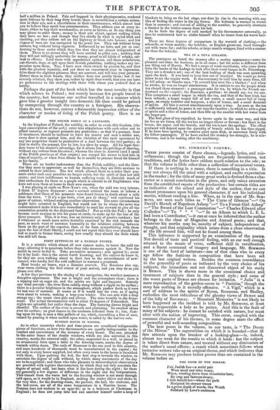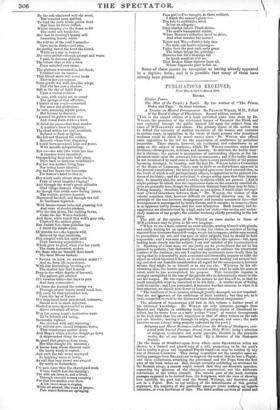MR. SIMMONS'S POETRY.
THESE poems consist of three classes,—legends, lyrics, and mis- cellaneous; though the legends are frequently inventions, not traditions, and the lyrics have seldom much relation to the ode ; so that the volume is little other than a collection of occasional verses.
If there is nothing in a name, there is something in a title. It may not always fill the mind with a subject, and excite expectation in the reader ; for the title of many great works is derived from a cha- racter or a moral conclusion in the piece, and only raises attention from the established repute of the production : but certain titles are so indicative of the school and style of the author, that we can almost pronounce upon his general character, if not his individual merits, without reading a line. When, as in the case of Mr. Six- mom, are seen such titles as "The Curse of Glencoe"—" On David's Sketch of Napoleon Asleep "—" To a Forest-Girl Asleep" —" The Sword of the Last Constantine"—" Charles Edward after Culloden"—" To * * * "—" In an Album to which L. E. L. had been a Contributor,"—it can at once be inferred that the author belongs to the class of Magazine and Annual poets ; and that, whatever his merits may be, novelty of subject, independence of thought, and that originality which arises from a close observation of the life around him, will not be found among them.
This inference is supported by an examination of the poems. Not devoid of taste and poetical feeling, with an ear well enough attuned to the music of verse, sufficient skill in versification, and a fluent command of imagery and language, Mr. Sistatosis is one of the herd of imitators—one of that class who in every age follow the fashions in composition that have been set by the last original writers. Besides the common resemblance to the generality of poets as indicated by the very choice of his subjects, the immediate and not disavowed object of his study is BYRON. This is shown more in the occasional choice and treatment of subjects than in the general style ; and some of the worst parts of BYRON are chosen for imitation. "Julia" is a mere reproduction of the garden-scene in " Pariaina," though the story has nothing in it morally offensive. "A Vigil," which is a sort of address to the spirits of Byron, Rousseau, and Shelley, embodies the most ridiculous of the gloomy views of BYRON and of the folly of ROUSSEAU. " Mountain Memories" is not likely to have happened as the incident is told by Mr. SiNixtoNs, at least with so respectable a lady as he paints. And this is the fault of many of his subjects : he cannot be satisfied with nature, but must alter with the notion of improving. This error, coupled with the common character of his themes, in some degree mars the effect of powerful and well-sounding composition. The best poem in the volume, to our taste, is "The Doom of the Mirror." The superstition on which it is founded—that ill fate attends upon the breaker of a looking-glass—is, indeed, almost too weak for the results to which it leads : but the subject is taken direct from nature, and treated without any diminution of the author's usual effects ; a result which sometimes follows when imitative writers take up an original theme, and which indicates that Mr. SIMMONS may produce better poems than are contained in the volume before us.
THE DOOM OF THE MIRROR.
Fair Judith Lee—a woffil pair Were steed and rider weary, When, winding down from mountains bare, By crag and fastness dreary, I first beheld her—where the path Resigned its sterner traces In a green depth of woods, like Wrath Subdued by Love's embraces. By the oak-shadowed well she stood, Her rounded arms uplifted, To bind the curls whose golden flood Had from its fillets drifted, Whilst stooping o'er the fount to fill The rustic urn beside her, Her face to evening's beauty still Imparting beauty wider.
She told me of the road I missed—
Gave me to drink—and even At parting waved the hand she kissed, White as a star in heaven ;
But never smiled—though prompt and warm
I paid, in duteous phrases, The tribute that so fair a form From minstrel ever raises.
The gladness murmured to her cheek,
Unfolded not its roses—
That bluest morn will never break That in her eye reposes. Some gentle wo, with dovelike wings, Had o'er her cast a shadow, Soft as the sky of April flings Upon a vernal meadow.
In vain, with venial art, to sound The springs of that affliction,
I hinted of my craft—renowned
For omen and prediction ; In vain, assuming mystic power, Her fortune to discover, I guessed its golden items o'er, And closed them with—a lover.
It failed for once—that final word—
A maiden's brow to brighten ; The cloud within her soul, unstirred, Refused to flash or lighten.
She felt and thanked the artifice, Beneath whose faint disguising I would have prompted hope and peace, With accents sympathizing.
But no—she said (the while her face A summer wave resembled, Outsparkling from some leafy place,
Then back to darkness trembled)—
For her was neither living hope Nor loving heart allotted; Joy had but drawn her horoscope For Sorrow's hand to blot it.
Her words made silvery stop—for lo, Peals of sweet laughter ringing!
And through the wood's green solitudes Glad village-damsels winging I As though that mirth some feeling jarred, The maiden, pensive-hearted, Murmured farewell, and through the dell In loneliness departed.
With breeze-tossed locks and gleaming feet And store of slender pitchers, O'er the dim lawns, like rushing fawns, Came the fair Water-fetchers ; And there, while round that well's gray oak, Cluster'd the sudden glory, Fair Judith Lee, from guileless lips I heard thy simple story.
Of humble lot—the legends wild, Believed by that condition, Bad mingled with her spirit mild Their haunting superstition; Which grew to grief, when o'er her youth The doom descended, spoken On those who see beneath their touch The fatal Mirror broken.
"NEVER IN LIFE TO PROSPER MORE!"
And so, from life sequestered, With dim forebodings brooding o'er The shafted fate that festered Deep in the white depths of her soul, The patient girl awaited Ill's viewless train—her days to pain And duty consecrated.
At times she deemed the coming wo Through others' hearts would reach her, Till every tie that twined her low, Upon the lap of Nature Her once-loved head unwatched, unknown, Should sink in meek dejection, Hushed as some Quiet carved in stone Above entombed affection.
E'en her young heart's instinctive want To be beloved and loving, Inexorably vigilant, She checked with cold reproving : For still she saw, should tempests frown, That treacherous anchor sever, And Hope's whole priceless freight go down A shipwrecked thing for ever.
So pined that gracious form away, Her bliss-fraught life untested; A breeze-harp whose divinest voice On lonely winds is wasted.
And such the tale to me conveyed In laughing tones or lowly, As still that rosy crowd was swayed By mirth or melancholy.
I've seen since then the churchyard nook Where Judith Lee lies sleeping; The wild ash loves it, and a brook Through emerald mosses creeping : For that lost maiden ever there A low sweet mass is singing, While all around, like nuns at prayer, Pale water-flowers are springing. Poor girl !—Eve thought, as there reclined,
I drank the sunset's glory—
Thy tale to meditative mind Is but an allegory : Once shatter inborn Truth divine, The soul's transparent mirror, Where Heaven's reflection loved to shine, And what remains but terror?
Terror and Wo ;—Faith's holy face
No more our hearts relieving—
Fades from the past each early grace The future brings but grieving; However fast life's blessings fall In lavish sunshine o'er us, That Broken Glass distorts them all, Whose fragments glare before us.
Some of these poems we recognize as having already appeared in a fugitive form; and it is possible that many of them have already been printed.



























 Previous page
Previous page